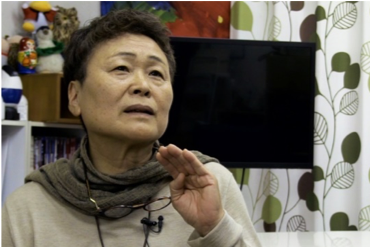It has been 9 years since the Fukushima Daiichi Nuclear Power Plant accident. People who are still suffering from the pain, suffering, and the loss caused by the accident are trying to stand up.
Here, we will introduce the voices of Kenichi Hasegawa, a former dairy farmer who returned to Iitate Village, Seiji Sugeno, an organic farmer in Nihonmatsu City, Mizue Kanno, who evacuated from Namie Town to Kansai, and the mother of Fukushima, who once evacuated and returned, in a digest. The interview (About 10 minutes of video) is scheduled to be released on the FoE Japan website.
1. Hasegawa Kenichi (Villagers of Iitate)
2. Seiji Sugeno (Living in Nihonmatsu, an organic farmer)
3. Mizue Kanno (Evacuated from Namie Town to Kansai)
4. Mother living in Fukushima
Mizue Kanno (evacuated from Namie town to Kansai region)Interviewer: Ruiko Muto (resident of Miharu town)

Mizue Kanno: Her home was in a designated “difficult-to-return zone,” 27 kilometers from the TEPCO Daichi nuclear plant where the accident occurred. She evacuated from Namie to Kansai, where she is farming. She frequently speaks publicly about what happened at the time of the nuclear accident. She refuses to be silent about the accident. As a 67-year-old she believes “Speaking out is the responsibility of my generation, which allowed the nuclear plant to be built.”
“It’s dangerous here. Escape!”
Kanno: After the nuclear accident, I finally made it home to Tsushima, Namie Town from Okuma. On the evening of the 12th, I think it was between 3 and 4 pm, someone showed up wearing a gas mask, looking like nothing I had ever seen before. The masked person shouts something. I said I couldn’t hear it, so the person said, “It’s dangerous here. Escape!”
On the morning of March 15th, my son went out to cook at a soup kitchen for evacuees at 6 am and came back at 8, and said the whole town had to evacuate at 10 am. He said everybody told him, “This will be handled later, so you should go to Osaka where your father is.” We siphoned gasoline from the cultivator machine into our small car and drove away, making space for our dog. We fled to Koriyama. We were screened at the gymnasium. We lined up for three hours, and it started snowing. After I had heard about the explosion at the nuclear plant, I kept our dog indoors. But our dog likes people, so when many people evacuated to Tsushima, it had run outside. So I asked them to screen our dog as well, but was told they would not screen dogs.
Needle hit the maximum reading
When they measured my head and jacket, the needle on the Geiger counter hit the maximum reading. I didn’t know it at that time, but now I realize it was over 100,000 counts per minute (cpm). They said they had to take my jacket. The attendant had a very thick plastic bag ready, and told me, “I’ll put it in here. Put this in the furthest corner of your car and wash it after at least a week.” I took off my jacket and once again had a reading done, this time for the sweater and jeans I was wearing. The needle stopped at 8. So they said I was fine. Later I realized this meant 80,000 cpm. My son’s pants were the same. I think the pant cuffs had a higher reading. Under those circumstances we evacuated by car.
No one would sell us any gasoline. If we could escape to Nagano, we could get to Gifu (on the way to Kansai), so we decided to start by aiming for Nagano. I fought with my son in the confined space of the car. He said, “I didn’t want to evacuate. If I can’t make a living where we go, I will return to Tsushima.” I told him I would not let him go back. Then I decided to get out of the car and started walking with the dog. I said, “I’ll walk and save our dog.” After about an hour, my son caught up with us and silently opened the door. We took turns driving all night long, and morning broke when we reached Karuizawa. It was 6 a.m. Then I saw a gas station opening for business. I asked if they could sell us gas. The attendant asked if I wanted a full tank. I could not believe it, and asked if I could really have a full tank. I was elated. We got a full tank.
There was a major coffee chain at the first rest stop after we got on the highway. They were selling coffee just as if it was a normal day. I always drink my coffee black, but I remember drinking a latte that day. My tears began to flow and didn’t stop. “Why is everything normal here? We can’t see our tomorrow. But here, life is normal.” I felt something was wrong with me. We washed off the contamination at my sister’s place. I didn’t change my shoes. I went to my husband’s place, and washed my clothes and shoes. When I think about how much contamination I left behind there… I feel bad about that.
Muto: This is a shocking story. So many conflicted feelings. I evacuated for a while too, with my husband. We had big fights, but then returned to Fukushima. After all, there are so many burdens that individuals have to bear. The nuclear accident was not our fault. But we had to bear the terrible consequences. Evacuation meant that people had to relocate and to leave many parts of their own lives behind.
